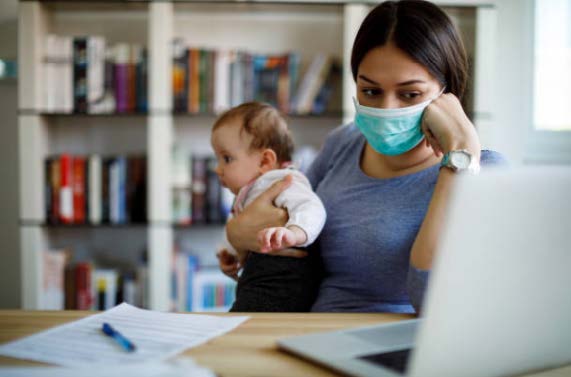Co-parenting during a pandemic is no different than when there is no pandemic: decisions should be made in your child’s best interests.
By Jeff Keller, family lawyer at Legal Aid Alberta
Co-parenting during a pandemic is no different than when there is no pandemic: decisions should be made in your child’s best interests. This usually means doing what you can to work together, solve problems, and be generous with each other.
If a conflict does arise, consider looking for help from a trusted third party or mediator who can assist you over the phone or by video conference. If informal or formal mediation won’t work, contact a lawyer as they can still assist and help resolve matters even when the courts are closed.
When courts are closed, do we still have to follow a court order?
Yes. All court orders remain valid and must be followed. Some judges have already warned parents that if they act unreasonably during this period, their unreasonable behavior may be used against them in the future. Parents are expected to behave reasonably based on the best interests of their children.
It is understandable that parents will be worried about their children and their safety at this time. But remember, courts base decisions on evidence. Simply being worried will not be a sufficient reason to change a court ordered parenting schedule.
If changes are required during this time due to illness or requirements to self-isolate or orders to be under quarantine, it is expected the parents will come up with reasonable alternatives or work with third parties to arrange alternatives.
Ensure any agreed temporary changes are in writing, such as an email conversation.
How do we safely exchange the children?
If the exchange location was a neutral location such as a McDonald’s or a school, try to work with the other parent to agree upon a new location. If safety is not a concern, you may still be able to meet at the same location but just wait in the parking lot
If safety is a concern and the location was chosen to ensure it was in public with other people around, pick a new location that remains open such as a grocery store. You may want to consider a police station, but it should usually be your last resort.

What if I am showing symptoms of COVID-19 and my children are with me?
Contact 8-1-1 and follow their advice. If the children are required to self-isolate for a period of days and should not be in physical contact with other people, including the other parent, advise the other parent immediately.
Work out alternative ways for the children and the other parent to stay in touch during this time such as telephone/Facetime/ Skype contact. Be reasonable and generous. Also, consider providing the other parent some make up time once the children are allowed to see them again.
What if I am showing symptoms of COVID-19 and my children are with the other parent?
Contact 8-1-1 immediately and follow their advice. Consider your children’s safety. If you are required to self-isolate and not have contact with other people, the children will likely be better off remaining with the other parent during the time you must self isolate. Contact the other parent and arrange alternative forms of contact such as telephone/Facetime/Skype.
How do we let children go back and forth between homes?
Remember, if there is a court order in place dealing with parenting, that order remains in full force and effect even during the pandemic and while the courts are closed.
That order needs to be followed so long as the children’s safety remains protected. Both Alberta Health Authority and Health Canada have suggested two households can become a “common isolating group” or “cohort group” to allow all members of both households to be in contact with each other.
If all members in both households agree to adhere to the strict guidelines issued by public health agencies and all are currently not ordered to self-isolate, the members can remain in contact and the children can move back and forth.
Ensure a plan is also in place for the exchange of the children to ensure proper requirements are in place to protect everyone during the exchange.

What if there is a No Contact Order between the parents and exchanges are performed by a third party?
No Contact Orders remain in full force and effect and must be followed. If the third party who has been providing services for exchanging children is no longer available, all reasonable steps must be taken to find someone else to exchange the child.
What if there is no court order or formal parenting agreement in place?
Do your best to follow whatever informal plan you may have had in place prior to the pandemic. If a plan must be put in place and assistance from a neutral party is required, consider retaining a mediator and/or an arbitrator to help reach decisions.
You can still have lawyers assist you in reaching a plan and preparing a Parenting Agreement. Family lawyers usually recommend going to Court as the final option, so there is still a lot they can do while Courts are closed.
Be creative. Focus on the children’s needs. And remember, a plan can just be temporary and further details and long-term needs can be worked out later. Come up with a plan for now and worry about the rest when the pandemic comes to an end.
What if I think the other parent or someone living with the other parent is not following public health recommendations?
Remember, actual evidence/proof will be required to make changes to existing arrangements. If there is proof a parent is not properly following the recommendations or requirements issued by Public Health, such as email, text conversations, or Facebook posts, you can take reasonable steps to protect the children.
Continue to work with the other parent to encourage them to follow public health recommendations. Work with the other parent to develop temporary alternatives for contact if going to the parent’s home is not safe or practical.
What if the other parent refuses to return the child for my parenting time?
This can be a difficult situation as Enforcement of Time may not be considered an urgent matter for the court to hear. Attempt to negotiate a return. Considering using a neutral third party, someone the other party trusts, to help negotiate a return.
If the order has a police enforcement clause, contact police for assistance. If there is no police enforcement clause, sometimes police will still assist.
If you feel your child is in danger and not being properly protected, it would likely be considered “urgent” and the Court may be willing to deal with it.
If a significant period of time has gone by without return, the court may also consider the matter “urgent.”
What if I get laid off because of the pandemic and can no longer afford to pay the ordered support?
If there is a court order to pay support, that order remains in full force. If the order is registered with Maintenance Enforcement, it must be enforced. If you must pay less, give as much notice and financial information showing job loss to the other parent as you can. Pay as much as you can.
Try to work out a new temporary amount of support. If an agreement is reached, the parent responsible for payment should contact the Maintenance Enforcement Program (MEP) and discuss payment plans. The staff at MEP are very understanding and are looking for ways to assist families.
What if my caseworker suspends my face-to-face visits during the pandemic?
If there is a court order granting you visits with your children, that order must still be followed. While some changes may be required if a supervisor becomes ill or if the location of visits has closed, your case worker and/or support worker should be working with you to come up with options to ensure you still have your visits.
If face-to-face visits are not possible because either you, your child or their caregiver has fallen ill or are required to self-isolate, other options are still available such as telephone/ Facetime/Skype. Your caseworker and/or support worker should assist to arrange such alternate visits.
What if I can’t attend my required programming during the pandemic?
Stay in touch with your caseworker or support worker as much as possible. Together other options may be arranged. Also contact the program provider and see if they have arranged for options such as offering programs online or by telephone.


